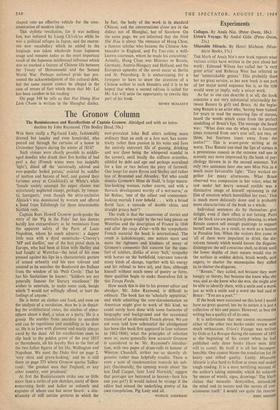The Gronow Column
The Reminiscences and Recollections of Captain Gronow. Abridged and with an intro- duction by John Raymond. (The Bodley Head, 50s.) WAS there really a Pig-faced Lady, fashionably dressed but touchy and even homicidal, who peered out through the curtains of a house in Grosvenor Square during the winter of 1814?
Such visions were clearly possible to middle- aged dandies who drank their five bottles of bad port a day (French wines were too insipidly `light), dined off the 'universally adored and ever-popular boiled potato,' assisted by saddles of mutton and barons of beef, and gamed their fortunes away at Crockford's or White's while `female society amongst the upper classes was notoriously neglected except, perhaps, by roman- tic foreigners,' even though the ultra-exclusive Almack's was dominated by women and offered a band from Edinburgh for those interminable Scottish reels.
Captain Rees Howell Gronow pooh-poohs the story of the 'Pig in the Poke' but has dozens hardly less extraordinary as he reminisces from the apparent safety of the Paris of Louis Napoleon, whom he much admires: a dapper little man with a dyed moustache—Creevey's 'MP and duellist,' one of the best pistol shots in Europe, who had been at Eton with Shelley and had fought at Waterloo—the head of his cane pressed against his lips in a characteristic gesture of armed urbanity and his eyes tolerant and amused as he searches the Boulevard des Italiens from the window of his 'Petit Cercle.' That he has his limitations he knows: 'Soldiers are not generally famous for literary excellence.' He wishes to entertain, to make some cash, beside which 'I would not willingly offend, or hurt the feelings of anyone.'
He is better on clothes and food, and even on the analysis of a revolution, than he is in depict- ing the architectural vistas, the nimbus of atmo- sphere about a duel, a salon or a party. He is a gossip. He scuttles from anecdote to anecdote and can be repetitious and muddling as he does so. He is in love with glamour and nearly always awed by the dead. All his recollections seem to slip back to the golden grave of the year 1815 or thereabouts, all his loyalty flies to the feet of the two father figures of his life, Wellington and Napoleon. We meet the Duke first on page 2, `very stern and grave-looking,' and he is still there on page 375 where Gronow quotes Talley- rand : 'the greatest man that England, or any other country, ever produced.'
At first the Rethiniscences strike one as little more than a series of pen sketches, many of them concerning lords and ladies or colonels and captains of whom one has never heard: a sim- ultaneity of stiff outsize gestures in which the ever-prevalent John Bull utters nothing more ordinary than an oath or a bon mot, has eccen- tricity rather than passion in his veins and lives the entirely extrovert life of gaming, drinking and war (love being the whispered scandal in the corner), until finally the stiffness crumbles, nibbled by debt and age and perhaps moralised for a line or two before the piety of farewell. One longs for more Byron and Shelley and rather less of Brummel and Alvanley. Yet who could dismiss Gronow's Mme de Stahl, 'a large mascu- line-looking woman, rather coarse, and with a thoracic development worthy of a wet-nurse,' or his Balzac, 'one of the oiliest and commonest- looking mortals I ever beheld . . . with a broad florid face, a cascade of double chins, and straight greasy hair'?
The truth is that the succession of stories and portraits is given weight by the two long pieces on Waterloo and the description of France in 1848 and after the coup d'etat—with the sympathetic French material the book is international. The result is kaleidoscopic; one notices more and more the rightness and kindness of many of Gronow's comments (his concern for the com- fort of soldiers, dislike of army 'bull,' sympathy with horses on the battlefield, tolerance towards many kinds of change, together with his energy and his refusal to bore us), and thus, although himself without much sense of poetry or form, these qualities begin to make themselves felt in this Temps Perdu.
How much this is due to his present editor and abridger, Mr. John Raymond, is difficult to estimate. The book has no 'scholarly apparatus,' and while admitting the over-documentation an American might give to work of this kind, we could surely have done with some footnotes of biography and background and the occasional translation of an idiomatic French phrase. We are not even told how substantial the abridgement has been (the book first appeared in four volumes in 1862-1866), what the principles of selection were or, more generally, how accurate Gronow is considered to be. Mr. Raymond's introduc- tion, with two pages of drum-rolls in honour of Winston Churchill, strikes me as showily di- gressive rather than helpfully erudite. There is even a note of condescension towards his sub- ject. (Incidentally, the opening words about 'the late Duff Cooper, later Lord Norwich,' suggest that peerages are bestowed in heaven--how late can you get?) It would indeed be strange if the editor had missed the underlying poetry of his own 'compilation, Pig Lady and all.
PATRICK ANDERSON


































 Previous page
Previous page